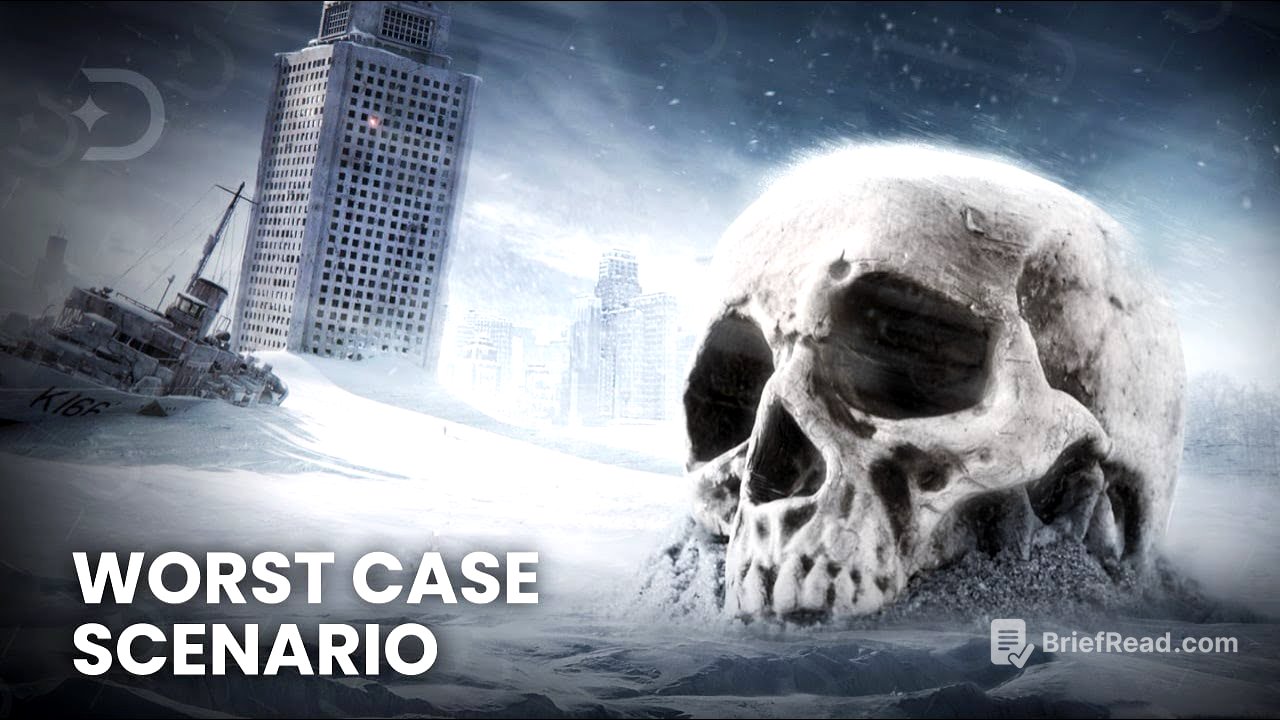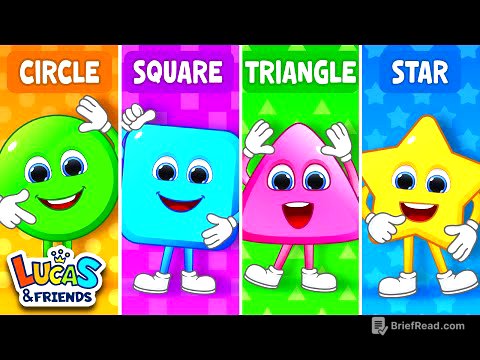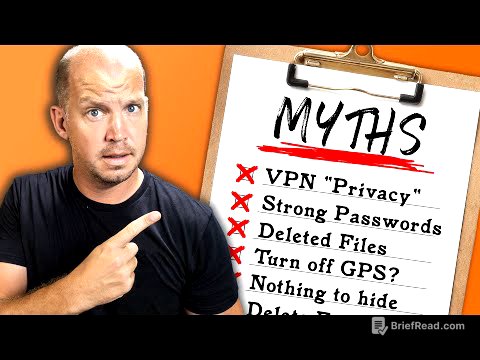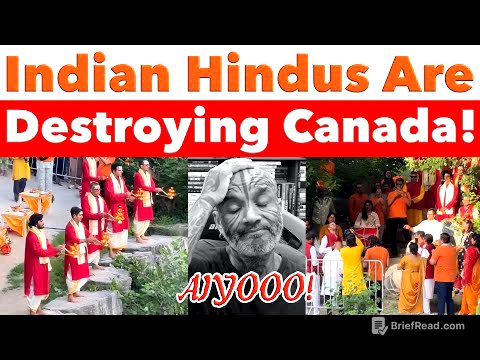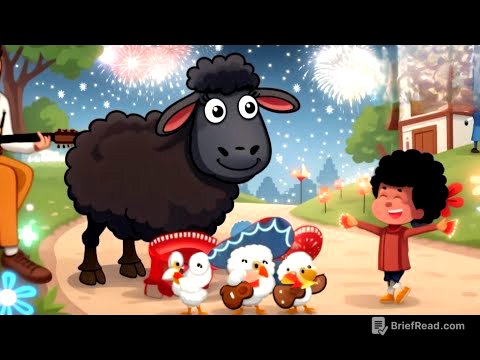TLDR;
Okay ji, here's the summary of the video. Basically, it talks about different ways the Earth could turn into a hot hell, from supervolcanoes to ice ages and nuclear war. It also discusses potential asteroid impacts and what would happen if the Earth stopped spinning. Here are the key takeaways:
- Supervolcanoes and volcanic floods are way more destructive than nuclear weapons.
- The Earth is currently in an interglacial period, and a new ice age is coming, maybe sooner than we think.
- Nuclear war would be devastating, leading to a nuclear winter and the collapse of civilization.
- Asteroid impacts are a real threat, and we need to develop better ways to deflect them.
- If the Earth stopped spinning, things would get real bad, real quick, with extreme weather and radiation.
Intro: Planet's Potential Doomsday Scenarios [0:00]
The video starts by saying that the end of the world could be way worse than what we imagine, like dinosaurs getting wiped out or a nuclear war. It hints at other potential disasters that could turn Earth into a hot hell.
The Earth's Mantle and Volcanic Eruptions [0:18]
To understand how Earth could turn into hell, we need to look inside the planet. The mantle, a layer of hot, molten rock and minerals called magma, makes up 80% of Earth's volume. The movement of magma causes lithospheric plates to move, creating mountains, earthquakes, and volcanoes. Magma plumes can lead to the formation of magma chambers and calderas, which are the basis for volcanoes and supervolcanoes.
Volcanic Explosivity Index (VEI) and Historical Eruptions [1:26]
The video talks about the VEI scale, which volcanologists use to measure the strength of volcanic eruptions based on the amount of tephra ejected. The Krakatoa eruption in 1883 (VEI 6) caused a tsunami and global cooling. The Tambora eruption in 1815 (VEI 7) led to a "year without summer" with crop failures and extreme weather. But these are nothing compared to super eruptions.
Supervolcanoes and the Yellowstone Caldera [3:02]
Super eruptions, reaching VEI 8, are massive discharges of magma, ash, and aerosols. Supervolcanoes, like the one in Yellowstone National Park, can cause global climate change. The Yellowstone Caldera has erupted three times in the past 2.1 million years. A hypothetical super eruption of Yellowstone could destroy the surrounding states, collapse the North American agro-industry, and cause a volcanic winter.
Toba Super-Eruption and Volcanic Floods [5:59]
The Toba super-eruption 74,000 years ago may have almost wiped out humanity. Volcanic floods are even more catastrophic, with emissions in the millions of cubic kilometers. These events form huge plains called traps and can last for hundreds of thousands of years. The Siberian traps and Deccan traps are linked to mass extinction events, like the one that killed the dinosaurs. Volcanic floods release massive amounts of carbon dioxide, leading to extreme global warming and toxic oceans.
The Coming Ice Age and Past Glacial Epochs [12:14]
The video then shifts to the possibility of another ice age. Earth has experienced many ice ages throughout its history, and we are currently in an interglacial period. Scientists study ice samples and sediment to understand past glacial epochs. The Huronian and Cryogenian ice ages were particularly severe. The Andean-Saharan ice age ended with the Permian Extinction, possibly caused by a methane hydrate bomb.
Factors Influencing Ice Ages and Potential Scenarios [16:10]
Global cooling can be caused by decreased solar activity, changes in Earth's orbit, and volcanic eruptions. The Earth is currently in an interglacial period, but a new ice age could be coming soon. Global warming might even accelerate global cooling by melting Arctic ice and increasing snowfall in subpolar regions. A new ice age would drastically change the Earth's landscape and climate, making life difficult for humans.
Surviving the Next Ice Age: Technological Solutions [23:51]
To survive the next ice age, we could use technologies like greenhouse gas emissions, fusion energy, and hydroelectric power from glaciers. Genetic modification could create cold-resistant crops. However, a mild ice age or a completely new form of climate change is also possible. The Earth could become a "Baked Alaska" with a cold interior and a warm atmosphere.
Monster Comets and Killer Asteroids [26:37]
The video moves on to discuss space threats, like comets and asteroids. Scientists have discovered a monster comet, C/2014 UN271 (Bernardinelli-Bernstein), which is currently heading towards our solar system. While it's not expected to hit Earth, other asteroids pose a greater threat. NASA is planning a mission called DART (Double Asteroid Redirection Test) to test the kinetic impactor technique for deflecting asteroids.
Rogue Comets and Asteroid Impact Avoidance [33:16]
Amateur astronomers have also made important discoveries, like the rogue comet 2I/Borisov. This comet has a unique composition and may contain unaltered information about the materials that formed it. NASA is working on asteroid impact avoidance strategies, but time is crucial. The earlier we spot potentially hazardous objects, the better our chances of survival.
What if Earth Stopped Spinning? [36:24]
The video then explores what would happen if the Earth stopped spinning. If the Earth stopped rotating around the Sun, we'd all be toast, falling into the fiery plasma. If it stopped rotating on its axis suddenly, everything would be destroyed. A smooth slowdown would be worse, with the planet rushing towards the sun.
Consequences of a Sudden Stop vs. Gradual Slowdown [40:50]
If the Earth stops spinning quickly, there would be earthquakes and tsunamis. If the deceleration is slow, some buildings might survive, but it would still be a disaster. A gradual slowdown is happening now due to tidal forces. Eventually, the Earth's rotation will match its orbit, leading to a permanent dayside and nightside.
Long-Term Effects of a Slowing Earth Rotation [47:33]
With a synchronized rotation, the heat balance of the planet would change, leading to strong winds and extreme temperatures. The oceans would flow towards the poles, creating one giant continent. The magnetic field would weaken, leaving us vulnerable to solar radiation. Life would only be possible in small areas on the border between day and night.
Nuclear War Scenarios and Global Consequences [52:30]
The video then discusses the threat of nuclear war. Russia and the United States possess the vast majority of nuclear warheads. A massive nuclear strike could break through missile defenses and destroy entire countries. A nuclear war would lead to a nuclear winter, starvation, and the collapse of civilization.
Detailed Impact of a Nuclear Strike on New York City [1:00:12]
The video provides a detailed scenario of a nuclear strike on New York City, showing the devastating effects of the explosion, shock wave, thermal radiation, and radiation. The total estimated number of fatalities would be almost 1.8 million people.
Global Effects of Nuclear War and Potential Survival [1:03:44]
A full-scale nuclear war would release massive amounts of soot into the atmosphere, causing a global nuclear winter. Nuclear power plants would contribute to radiation contamination. The Yellowstone supervolcano could be triggered, leading to further devastation. The only chance of survival would be in underground bunkers, but even then, the future of humanity would be uncertain.
Asteroid Apophis and Near-Earth Objects (NEOs) [1:09:44]
The video concludes by discussing the asteroid Apophis, which will make a close approach to Earth in 2029. While scientists believe there is no danger of it hitting us, there is still a small probability of a future impact. NASA and other space agencies are tracking NEOs and developing asteroid impact avoidance technologies.
